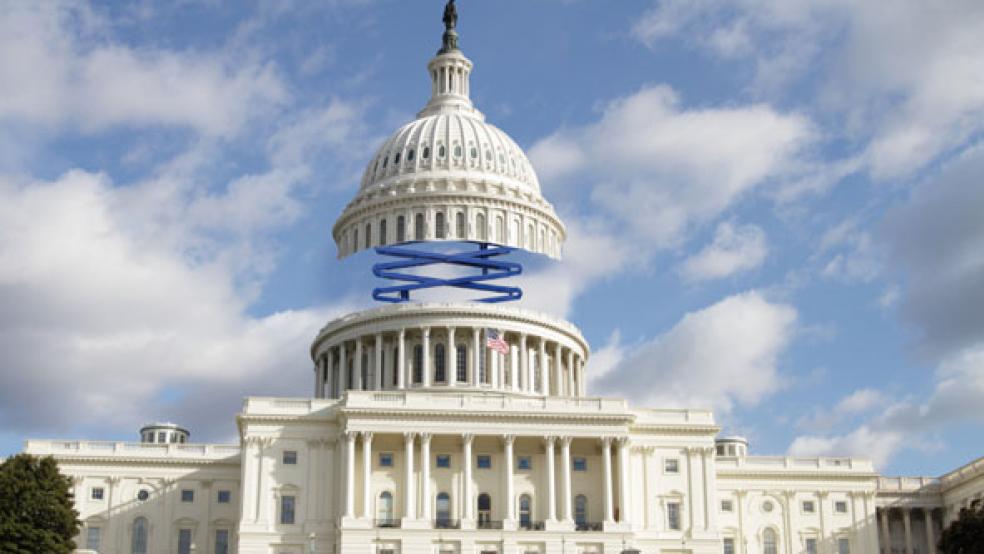House Republicans are bracing for war over the debt ceiling – and the Obama administration claims their strategy would throw the government into a perilous default.
But all three of the biggest credit agencies – Standard & Poor’s, Moody’s and Fitch Ratings – suggest otherwise.

In the GOP bill expected to pass the House on Thursday, Social Security and interest payments would be prioritized, if the government exhausts its $16 trillion-plus borrowing authority over the next several months.
Should the current debt ceiling stalemate continue, President Obama might be forced into emergency spending cuts that are capable of devastating the economy. But as long as interest and principal payments are untouched, a default would not be triggered.
“The only payments that ultimately matter to us are on the marketable debt,” said Nikola Swann, S&P’s primary analyst on U.S. sovereign debt ratings.
Moody’s said in a February note that “the government has the ability to continue to meet its debt obligations” even if federal officials are forced to suddenly reduce expenditures.
“As a result, Moody’s is unlikely to institute a formal review of the government’s rating because of the debt limit question alone, even as the date approaches when spending needs to be prioritized,” the note concluded.
Fitch predicted in January that this kind of scenario would “very likely prompt a downgrade” but not “constitute a default.”
These statements appear to contradict the nightmarish gloom coming from the White House, which defines the default on much broader terms.
Administration officials argue that the GOP wants to keep bondholders and Social Security recipients whole, even though the hypothetical non-payments elsewhere would be a form of insolvency. It would be akin to a family keeping its mortgage current – while ignoring its electricity, credit card, phone, cable, auto insurance, and medical bills.
“Prioritization is default by another name,” Gene Sperling, director of the National Economic Council, declared at a conference Tuesday.
But even if Sperling’s use of the word does not mesh with what the ratings agencies say, the GOP plan is evidence of a dangerous stand-off on Capitol Hill. Many Republican lawmakers appear determined not to blink on the debt ceiling, setting up a game of chicken that might lead the stock and bond markets to panic.
The combustible set-up could also fizzle out.
The last showdown over the debt ceiling in 2011 stirred lots of apocalyptic visions. However, the last-minute bargain caused a relatively minor economic hiccup and an S&P downgrade from “AAA” to “AA+,” instead of the recession and cripplingly high interest rates that some economists had predicted.
The government officially maxes out its borrowing authority on May 18. At that point, the Treasury Department will adopt “extraordinary measures” – such as delaying funds for federal employee retirement plans – to keep everything afloat through September or October.
Government leaders have a few more months to negotiate than they did in 2011, when the extraordinary measures lasted through the start of August. This is largely because the 2013 deficit is projected to be $845 billion, about $455 billion less than in 2011.
The House Republican bill won’t clear the Democratic-majority Senate, essentially making it a shot across the bow. It tells Obama that his desired increase in the debt ceiling will hinge on a GOP-friendly deal that addresses issues such as tax reform.
“This is a message bill,” said Steve Bell, a former Republican Senate staffer who is now senior director of economic policy at the Bipartisan Policy Center. “It’s setting up a series of strategic options that are going to lead to a conflict.”
S&P has already factored the political dysfunction into its rating. A bit of chest thumping about debt prioritization has a minimal effect, said S&P’s Swann, “because nothing changes under the established legislation.”
Sponsored by Rep. Tom McClintock, R-Calif., the measure enables the government to keep borrowing to cover the costs of Social Security and servicing the national debt. In theory, this assures bondholders that their payments are safe.
Even if the prioritization concept does not qualify as a default, it is extremely controversial with the public and could backfire on the GOP.
The bill essentially establishes Chinese bondholders as being more important than U.S. military veterans and schoolchildren. Democrats can easily accuse the GOP of caring more about foreigners who hold Treasury notes than their own constituents. Republicans would be stuck in a scenario much like 2008, when Wall Street banks received a bailout, but Americans with underwater mortgages did not.
For the moment, House Speaker John Boehner has shrugged off this criticism.
"I just think it’s another tool,” the Ohio Republican recently told Bloomberg News, “that we can use to help impress upon the administration if it comes to the point where they don’t have enough money to pay all the bills, here’s some order that we think is sound."




